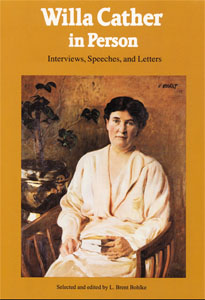from Willa Cather in Person: Interviews, Speeches, and Letters
Selected and edited by L. Brent Bohlke
Lincoln & London: University of Nebraska Press, 1986
Introduction
From the time Willa Cather made her oration at the Sunday School program in the Baptist Church in Red Cloud in 1885, she was frequently tempted to speak publicly. Her commencement address in 1890 was reprinted in full in the local paper. During her years at the University of Nebraska she acted in a number of plays and gave several orations. After she achieved fame she was asked to give speeches, lectures, and talks to all kinds of groups and organizations. She consistently turned down such requests. Only on rare occasions did she give speeches
Part of her reluctance is explained by an early experience that she had in Pittsburgh. A friend, Mrs. George Gerwig, had very quickly involved her in the club life of her new city and on one occasion had taken Cather to a tea given by the editor of the Dispatch. The topic of the day happened to be Carlyle. When the young journalist was called upon to give an impromptu speech, her college essay on Carlyle came back to her in a flash and she stood up and recited the entire work with great fervor and enthusiasm. She felt it was a great dramatic performance and said that all the women thought it had been improvised and fell all over one another trying to shake her hand. Following that experience she had been called on repeatedly to make other speeches, a great distraction. She needed to put a stop to speechmaking at once before it made more interference with her work (ALS to Mariel Gere, 10 August 1896, NSHS). She admitted to her old friend Will Owen Jones that she was able to write more stories in Red Cloud because she was too involved in the society act in Pittsburgh. Since she had been received more warmly than most strangers in Pittsburgh her vanity compelled her to be involved, and she could in no way play the role of a hermit (ALS to Will Owen Jones, n.d., but probably the summer of 1896 or 1897, NSHS)
Cather's years as a teacher and a new staff member at McClure's curtailed her speaking engagements for a time, no doubt because her work kept her so busy during these years. After she had published her first two novels and left journalism, she returned to Pittsburgh to give a speech about some of the materials and experiences she had gathered in the intervening years. Although she refused many requests to speak in the East, she seemed more ready to respond to those from the places she had lived before New York. In 1921, in an unprecedented spate of oratory, Cather gave at least four public addresses in her home state of Nebraska. Although she taught at the Breadloaf conference in Vermont in 1922 (her only such engagement), she did not give speeches again until 1925, when she undertook another tour, speaking at Bowdoin College, the University of Chicago, and Cleveland. On all of these occasions, Cather spoke out boldly about a number of controversial and deeply felt issues.
Her last major public address was a brief lecture carried by NBC radio at the Princeton banquet held in New York City in 1933. Since Cather had been the first woman ever to receive an honorary degree from Princeton University, the speaking engagement was a form of repayment.
Cather never considered herself a public speaker. Even though she received much recognition and appreciation for her speeches, her correspondence reveals that she never felt as much "in control" as she did when she was communicating in writing. The immediate response, while gratifying, threw her off -- appealed to her baser motives. In a 1925 interview in Grand Central Station (see "Interview" section), Cather said that she thought the "greatest obstacle" for American writers was "the lecture bug." She went on to say that lecturing was "especially destructive to writers, even so much worse than alcohol, takes their edge off." It destroyed the writer's higher sensitivities, made the writer feel "puffed-up" and self-important. Her final advice to the young writer who wanted to lecture was simple: "Don't!"

